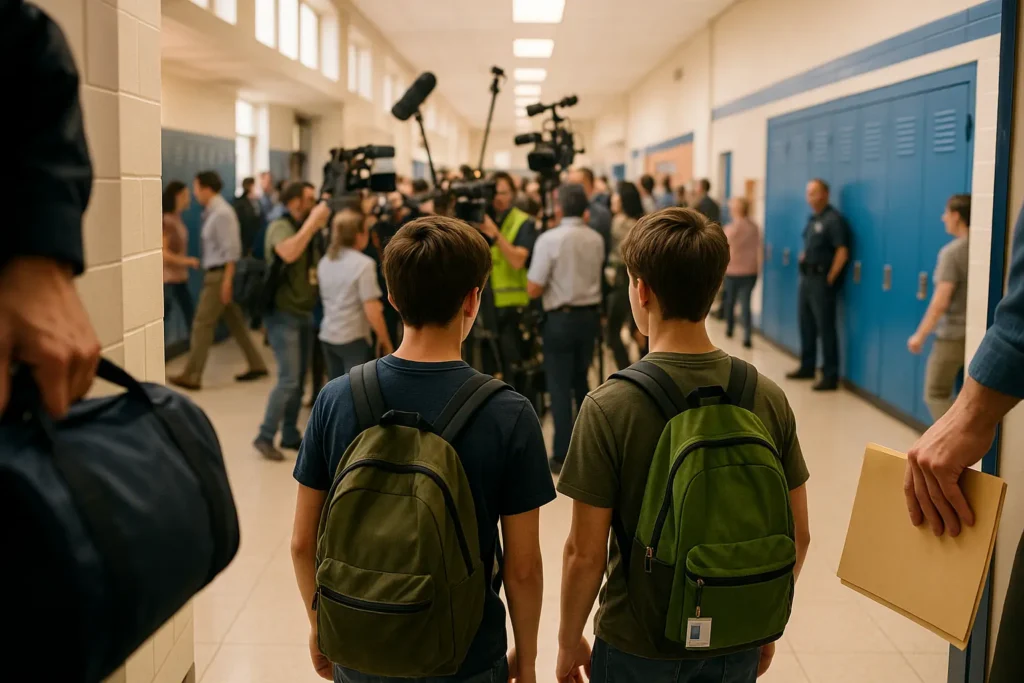Loudoun County School Controversy: Boys Suspended After Raising Privacy Concerns
On March 2025, a brewing controversy in Loudoun County Public Schools (LCPS) ignited a debate over privacy, fairness, and transgender policy enforcement within America’s public schools. At the center of this firestorm are two boys, students at Stone Bridge High School, whose suspensions reveal the clash between local “gender identity” rules and basic student rights.
The incident unfolded when three boys expressed discomfort with a biologically female student, who identifies as male, using the boys’ locker room and surreptitiously recording video on her phone as the boys changed. According to a detailed account by the Virginia Mercury, their concerns were met not with administrative understanding, but with disciplinary action and an official Title IX investigation (source).
The biological female who identifies as male filmed the then-sophomore boys, some of whom were changing clothes, in violation of school rules on video recording and, possibly, state privacy law. Yet in a shocking turn, rather than discipline the student for this breach, the school authorities focused their investigation on the boys who raised concerns.
“One of the biggest issues we’re seeing is the complete reversal of victim and perpetrator,” said a concerned parent, highlighting the confusion and distress many in Loudoun County feel about the district’s approach.
Parents and students now worry what message this precedent sets: when reporting a violation leads to punishment, and raising fundamental concerns about privacy is reclassified as harassment. As this case gains nationwide attention, supporters of parental rights and common-sense school policy demand accountability from those enforcing these controversial rules.
Administration’s Response: Retaliation, Federal Scrutiny, and Family Fallout
LCPS’s disciplinary response was both severe and swift. The two boys received ten-day suspensions and an order forbidding contact with the female student, even requiring class reassignments to ensure separation (Washington Examiner). For families caught in the crossfire, the policy’s real-world effects were immediate and heartbreaking.
In one notable development, the family of one suspended boy was forced to move out of Virginia, citing aggressive retaliation by LCPS against students who dissent (KOMO News). Their attorney warns that these suspensions will scar the boys’ academic records, threatening future college admissions—raising the stakes for families nationwide caught between powerful “equity” mandates and their children’s futures.
“We had to leave everything behind—our friends, our home, our roots—just to protect our son from further retaliation,” said the parent of one suspended student.
While the Title IX inquiry against a third boy was dropped (reportedly due to concerns about religious discrimination, as the student is Muslim), the ordeal didn’t end there. Instead, new sex-based discrimination allegations were filed against the two remaining boys. Compounding matters, the district’s own privacy and cellphone use policies appear to have gone unenforced against the transgender student.
This dramatic turn attracted the attention of Virginia Republican Attorney General Jason Miyares, who described the school’s response as “unjustifiable” and “unpalatable.” Miyares referred the case to the U.S. Department of Education and Department of Justice for review, citing troubling evidence of possible Title IX abuses and unlawful retaliation against the boys (WTOP News), as well as suppression of free speech within the district.
As these proceedings unfold, a clear message is emerging for students: when speech and privacy collide with progressive “equity” rules, administrators often act first and consider fairness last. This is not the America of fair play and open dialogue that parents and students have come to expect, and it’s a stark example of the dangers of local bureaucrats putting ideology before basic decency.
National Backlash and the Future of School Gender Identity Policies
LCPS’s actions have made Loudoun County ground zero in the national conflict over gender identity, privacy, and parental rights in education. But they’re not alone: The U.S. Department of Education found policies in five Northern Virginia school districts, including Loudoun County, violated Title IX by allowing transgender students to use facilities matching their gender identity, and demanded urgent policy reversals or risk major consequences (Washington Post).
Unlike during the Biden era, where federal agencies often sided with activist-driven school boards, President Trump’s (R) re-election has empowered conservatives to push back. In the wake of this report, the Trump administration threatened to revoke key federal funding unless districts restore sanity to bathroom and locker room policies. While the Loudoun County School Board stubbornly resists, their stance stands in open defiance of both community values and federal guidance.
“We will fight the Trump administration with everything we have,” declared the LCPS board president (D), in defiant remarks that have only energized parents and taxpayers demanding better for their children.
Local residents and lawmakers, along with a growing chorus of national conservative voices, now call for clear and respectful boundaries that keep private spaces just that—private. The recent Department of Education findings lay the groundwork for decisive enforcement, and for the return of policies that protect the privacy and dignity of all students—without silencing legitimate questions or concerns.
For Loudoun families and millions across the country, the stakes are higher than ever. This pivotal moment offers a powerful reminder: American schools work best when common sense—and respect for all—is the guiding principle, not bureaucratic dogma or political agenda.

